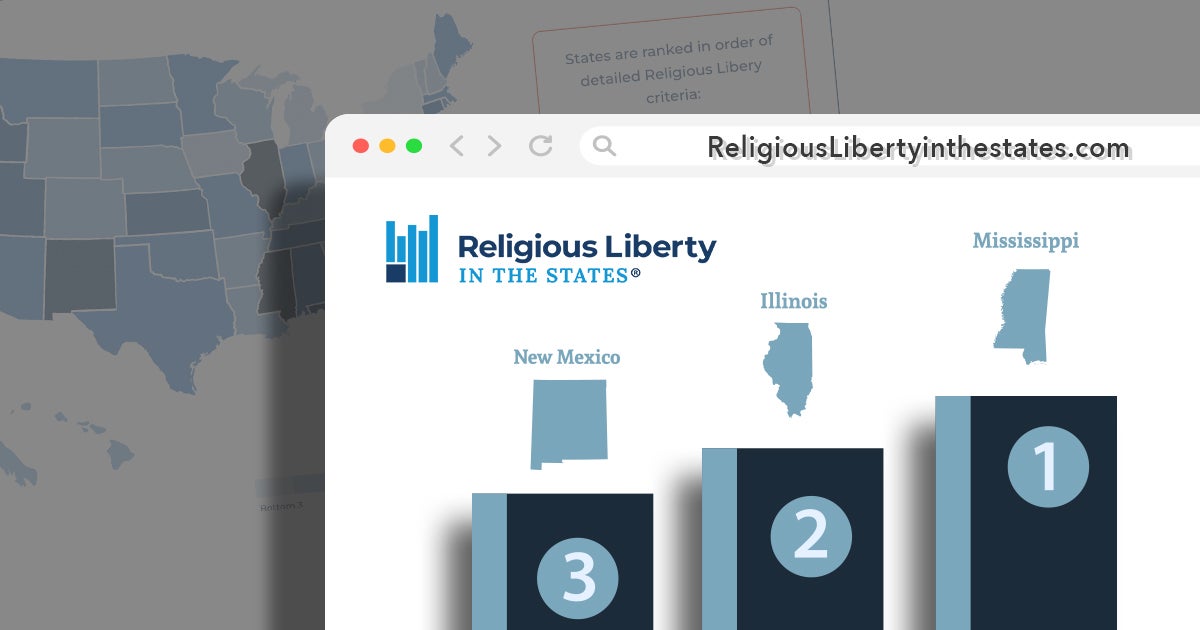
by Jorge Gomez • 4 min read
The Religious Liberty in the States Index (RLS) is having tremendous impact across the country. Several states have recently passed bills, or are actively considering legislation, to add more religious liberty protections because of the RLS.
First published in 2022 by First Liberty’s Center for Religion, Culture and Democracy, RLS is a nationwide annual index of domestic religious liberty. It measures and ranks religious liberty protections for each of the 50 states. RLS focuses on select legal safeguard of religious exercise in state law, both in statute and constitutions.
RLS tracks the Opportunity for Absentee Voting as one of these key safeguards. Our experts document which states permit some alternative means of voting—through either statutory or constitutional safeguarding—if election day conflicts with religious observances or holidays. To learn more, visit this page.
The Arkansas state legislature recently passed a bill allowing absentee voting for a religious observance. SB 247 states that citizens will be allowed to cast an absentee ballot if they are “prevented from voting due to observance of a religious discipline or religious holiday during the entire twelve (12) hours that the polls are open on election day.”
Religious Freedom Restoration Acts (RFRA) are another important component measured by RLS. The report tracks whether a state had codified a RFRA, and, if so, whether it is located in its constitution or in statutory law. To learn more, visit this page.
At least 23 other states have some form of RFRA in place. State laws mirror the federal Religious Freedom Restoration Act, signed in 1993 by then-President Bill Clinton, which says the government must accommodate people’s religious practices when it can. It also gives citizens their day in court when they believe the government has violated their rights. RFRA laws have been a bulwark when religious Americans have had to fight in court in major First Amendment cases.
In West Virginia, the “Equal Protection for Religion Act” is heading to Gov. Jim Justice’s desk after moving through the legislature. The bill’s language closely resembles that of other states RFRA’s and the federal version. It stipulates that the government would not be able to “substantially burden” someone’s constitutional right to freedom of religion unless doing so “in a particular situation is essential to further a compelling governmental interest.”
In cases where the government can prove to the courts there is a “compelling interest” to restrict that right, it must demonstrate religious freedoms are being infringed upon in “the least restrictive means” possible.
Georgia is considering a similar bill: SB 180, the “Georgia Religious Freedom Restoration Act.”
RLS also tracks which states offer religious exemptions for clergy or religious organizations’ participation in or facilitation of marriage or wedding celebrations that would conflict with their religious beliefs. Additionally, the report notes which states provide open-ended protections for health-care providers such that they can decline to participate in any procedure for reasons of conscience.
In South Carolina, a bill called the “Live and Let Live Act” would bar the state from taking any action against a religious organization, person, or closely held corporation that declines to provide services on the basis of their religious beliefs about marriage and gender identity.
RLS is making a significant and unique contribution in America. It’s not just impacting the national conversation, but it is also prompting states to take action and shape their laws in a manner that protects religious freedom.
Be sure to visit the RLS website for an interactive national map, details on how each state scores, access to the full report, and more.
In Case You Missed It
Jordan Ballor, Director of Research at the CRCD, joined First Liberty Live! to discuss the index and which states have the most religious protections in America: